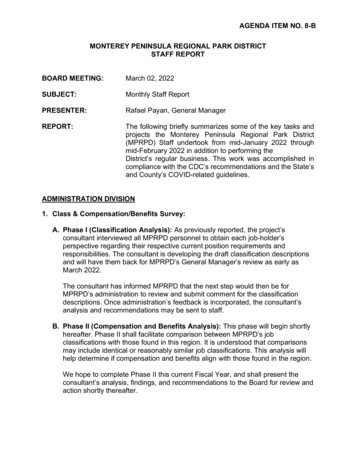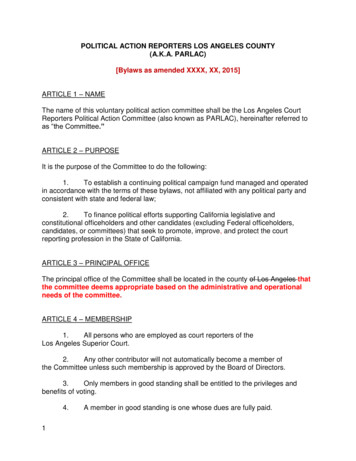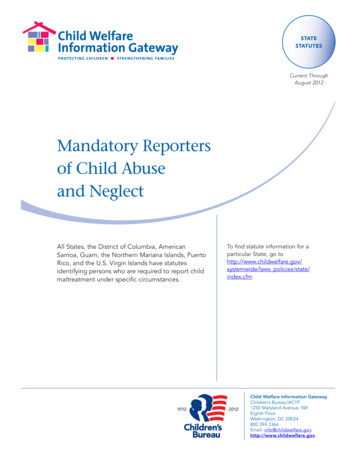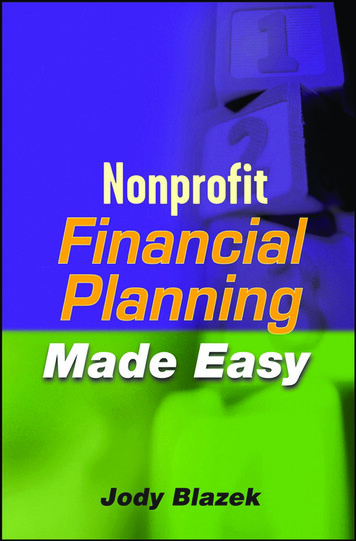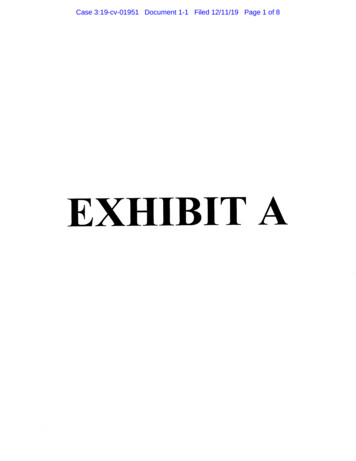
Transcription
Case 3:19-cv-01951 Document 1-1 Filed 12/11/19 Page 1 of 8EXHIBIT A
Case 3:19-cv-01951 Document 1-1 Filed 12/11/19 Page 2 of 8UNITED STATES DISTRICT COURTFOR THE DISTRICT OF CONNECTICUTTHE HARTFORD COURANT COMPANY,LLC,Plaintiff,v.Civil Action No.PATRICK L. CARROLL III, in his OfficialCapacity as Chief Court Administrator oftheConnecticut Superior Court; andANN-MARGARET ARCHER;KAREN A.BERRIS; ROBERT BURKE; ANTONIOD'ADDEO; RALPH DAGOSTINE; CYNTHIADEGOURSEY; JILL DRISCOLL; CAROLINEFARGEORGE;TAMMY FLUET; DAVID S.GAGE; ERIC R. GROODY; LISA C. GROODY;RICHARD L. HAAS,JR.; KERRI HALL;WILLIAM M. HOEY; JUDITH LEE;LAURA A.LEIGH; DEBORA KASZUBA NEARY; CARAPARKINSON; BRANDON PELEGANO; GINAPICKETT; JAMES QUINN; JENNIFERROBINSON; MARK SHEA; ROY SMITH, JR.;GIOVANNI SPENNATO; GEOFFREYSTOWELL; HARALABOS VALASSIS; JULIEVANAM; ROBERT A. WILOCK,H; BRANDIYANAVICH; and MARCI YOUNG,in theirrespective Official Capacities as Chief Clerks andDeputy Chief Clerks in the Judicial District andGeographical Area courts of the ConnecticutSuperior Court,Defendants.DECLARATION OF ANDREW JULIENI, Andrew Julien, declare as follows:
Case 3:19-cv-01951 Document 1-1 Filed 12/11/19 Page 3 of 81.I am the Publisher and Editor-in-Chief of The Hartford Courant. I have beenworking at The Hartford Courant for more than twenty-five years, first as a reporter, then asMetro Editor, and later as Integrated Media Editor. In 2012, I became Editor and Vice President.I assumed my current position as Publisher and Editor-in-Chief in 2016. I submit thisdeclaration in support ofthe Complaint filed by The Hartford Courant Company, LLC (the"Courant"), publisher of the The Hartford CoUrant, in the above-captioned case. I have personalknowledge ofthe matters stated in this declaration.2.The Hartford Courant is the largest daily newspaper in the state of Connecticutand is the oldest continuously published newspap6r in the United States. It is a two-time PulitzerPrize winner; it was awarded the 1992 Pulitzer Prize in Exploratory Journalism and the 1999Pulitzer Prize in Breaking News Reporting. Several individual reporters and photojournalistsemployed by The Hartford Courant have been named Pulitzer Prize finalists. The Courant isowned by Tribune Publishing Company, a publicly traded company headquartered in Chicago,Illinois.3.Because of its history and reputation for excellence in journalism, The HartfordCourant is a popular and trusted news source for Connecticut residents.4.The Hartford Courant regularly reports on criminal matters and criminal courtproceedings. Matters involving juveniles tried as adults are of particular interest to the public.Due to the potential vulnerability of such defendants, our readers are concerned not only with thefacts of their cases, but also with the conduct of the proceedings and the nature and quality of theevidence presented. The Hartford Courant's ability to provide robust reporting on these mattershelps the public to determine whether the proceedings are fairly conducted. It can also alert thepublic to possible improprieties and potential miscarriages ofjustice.2
Case 3:19-cv-01951 Document 1-1 Filed 12/11/19 Page 4 of 85.A well-known example of such a case is the prosecution of Peter Reilly. In 1973,Reilly's mother was found murdered, having been raped, beaten, and repeatedly stabbed. Afteran eight-hour police interrogation, during which no lawyer was present, Reilly—then ateenager—told police,"I definitely did what happened to my mother last night." Reillysubsequently recanted his statement.6.Reporters from The Hartford Courant attended Reilly's trial and reportedextensively on the proceedings. Reilly's statement was the primary piece of evidence presentedagainst him. He was convicted of first-degree manslaughter and sentenced to sixteen years inprison.7.The Hartford Courant's reporting shed light on potential flaws in the policeinvestigation and the prosecution's lack of evidence against Reilly. His conviction resulted insignificant public outrage and concern. Area residents—including Pulitzer Prize-winningplaywright and Connecticut resident Arthur Miller—rallied in support of Reilly and raisedmoney to hire a new legal and investigative team.' Three years later, Reilly was granted a newtrial and the charges against him were dismissed. The public interest and outcry that resultedfrom news coverage of Reilly's trial was, in my view, a key factor in further evidence beingobtained that ultimately helped to exonerate Reilly.8.Though Reilly was 18 years old at the time he was questioned by police,juvenilescan be particularly vulnerable in situations like the one experienced by Reilly, in which a youngperson, unaware of his or her legal rights, is interrogated for hours after a traumatic episode withno access to counsel. When the stakes can be as high as life imprisonment, it is imperative thatjournalists and news organizations like The Hartford Courant have access to court records andproceedings to ensure that the public is informed of any possible improprieties.3
Case 3:19-cv-01951 Document 1-1 Filed 12/11/19 Page 5 of 89.Under the Juvenile Transfer Act described in the Complaint, if a juvenile in asituation like Reilly's were to be tried for the same crime in Connecticut today, reporters for TheHartford Courant(and other members of the press and public) would be prohibited fromattending the trial or from accessing any judicial records or docket information regarding thecase.10.In the years since Reilly's trial, cases involving juveniles charged as adults havecontinued to be of significant interest to the community, and The Hartford Courant hascontinued to cover such cases extensively. For example, when 12-year-old Clinton Howell waskilled in a drive-by shooting in Bridgeport in December 2018, The Hartford Courant, along withother media in the state, reported on the incident and on the four young people (aged 18, 16, 14,and 12)arrested in connection with Howell's death.11.One ofthose individuals, 16-year-old Alexander Bolanos, was charged withconspiracy to commit murder and will be tried as an adult. The Hartford Courant is no longerable to access docket information or judicial records in his case because, on information andbelief, on or around October 1, 2019, his case'was sealed in accordance with the JuvenileTransfer Act. As a result, not only will reporters from The Hartford Courant be prohibited fromattending criminal proceedings in Bolanos' case, they will have no way of knowing when suchproceedings take place, absent a public statement from the prosecution or members of theBolanos or Howell families. Pursuant to the Juvenile Transfer Law,if Bolanos is acquitted, therecords of his case (including any hearing transcripts) will remain permanently sealed.12.The murder of a 12-year-old is a matter of significant interest to our readers. Thecommunity is, understandably, eager to learn more regarding the circumstances surrounding theshooting and the accusations made against those charged with participation in the homicide. But4
Case 3:19-cv-01951 Document 1-1 Filed 12/11/19 Page 6 of 8because of the Juvenile Transfer Act, the public will be deprived of answers to many of thesequestions, and unable to observe and evaluate Bolanos' prosecution. If the records of his caseremain under seal permanently (in the event he is found not guilty), the public will never havethe information necessary to help them assess whether justice was properly served.13.The Hartford Courant is now also prohibited from accessing judicial recordsrelating to one of the most high-profile criminal cases in the state of Connecticut—that of 59year-old Michael Skakel. Skakel, the nephew of Robert F. Kennedy's wife Ethel, was suspectedof beating his Greenwich neighbor Martha Moxley to de.ath with a golf club in 1975, when theywere both 15 years old. The story drew intense local and national media attention, due in part toSkakel's connections to the Kennedy family. Moxley's murder became the subject of multiplebooks, documentaries, and a made-for-TV movie.14.In 2000,the then 40-year-old Skakel was charged with Moxley's murder. Skakelargued that his case should be heard in juvenile court, as he was a teenager at the time of thehomicide. Skakel was ultimately ordered to stand trial as an adult, was convicted of murder, andsentenced to 20 years in prison. In 2018, after a lengthy and highly publicized legal battle, theConnecticut Supreme Court reversed Skakel's adult conviction on the grounds of ineffectiveassistance of counsel. Earlier this year, the U.S. Supreme Court denied a petition by stateprosecutors to have the adult conviction reinstated.15.Prosecutors are now considering whether to retry Skakel. On information andbelief, because Skakel's pending case is subject to'the Juvenile Transfer Act,judicial records anddocket information associated with Skakel's case have now been sealed.16.In the event Skakel is retried, The Hartford Courant and other members of thepress and public will be barred from attending any criminal proceedings in his case and from5
Case 3:19-cv-01951 Document 1-1 Filed 12/11/19 Page 7 of 8accessing any of the associated judicial records or docket information, permitting a 59-year-oldpublic figure to be tried in complete secrecy in connection with a murder that has captured thenational attention of the public for over 40 years.17.The Juvenile Transfer Act will also prevent The Hartford Courant from reportingon other matters of significant public interest that continue to occur throughout the State. Forexample, in October 2019, Yvonne Smith, a 71-yer-old Hartford grandmother, was killed whilecrossing the street on her way to the grocery store. After being struck by a speeding vehicle—which was allegedly engaged in a shoot-out Smith was launched in the air and run over,resulting in her death. A 16-year-old defendant has been arrested and charged withmanslaughter, with the possibility of additional charges. If his case is subject to the JuvenileTransfer Law, all docket infoimation and judicial records associated with his prosecution, and allhearings and other proceedings, will be closed to the public.18.The particularly violent and tragic death of an elderly grandmother who wasbeloved in her community is a matter of substantial concern to our readers. If the JuvenileTransfer Act applies, however, The Hartford Courant will be prohibited from accessing judicialrecords or attending criminal proceedings in the prosecution of the 16-year-old accused of beingresponsible for Ms. Smith's death. As a result, residents of Hartford will be deprived not only ofinformation regarding the events surrounding her tragic death, and of the State's efforts to seekjustice for her killing, but also of closure as a community.19.The Juvenile Transfer Act creates a significant impediment to The HartfordCourant's ability to inform its readers about matters of the utmost public interest and concern,and prevents The Hartford Courant from engaging in the kind of comprehensive, investigativereporting that the paper is known for and that serves the public interest.6
Case 3:19-cv-01951 Document 1-1 Filed 12/11/19 Page 8 of 8I declare under penalty of perjury that the foregoing is true and correct.Executed on December t ,2019 in14441 V:014.c LA"- .Andrew Julien
5. A well-known example of such a case is the prosecution of Peter Reilly. In 1973, Reilly's mother was found murdered, having been raped, beaten, and repeatedly stabbed. After an eight-hour police interrogation, during which no lawyer was present, Reilly—then a teenager—told police, "I definitely did what happened to my mother last night .


